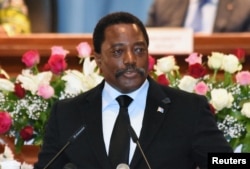Congolese authorities have arrested two people suspected of involvement in the murder of two U.N. workers in central Democratic Republic of Congo, but one of the prisoners has escaped, a senior prosecutor said Friday.
The announcement was the first reported sign of progress in an inquiry into the deaths of American Michael Sharp and Swede Zaida Catalan, investigators monitoring U.N. Security Council sanctions against individuals and armed groups in Congo.
Their bodies were discovered in a shallow grave on March 27, two weeks after they disappeared in the remote and sparsely populated Kasai-Central province.
Their Congolese interpreter and three Congolese motorbike drivers who accompanied them have not been found, according to the United Nations.
General Joseph Ponde, the army's top prosecutor, did not say when the two suspects were arrested, but said the remaining one had been transferred between facilities on April 4 — meaning the operation must have happened more than a week ago.
He referred to the one suspect in custody, Daniel Mbayi Kabasele, as an "insurgent," without offering further detail or suggesting a motive.
Four police officers responsible for guarding the suspects had been arrested following the escape, he told journalists.
The U.N. mission in Congo had no immediate comment.
Millions died in regional conflicts in eastern Congo between 1996-2003, most from hunger and disease, and dozens of armed groups continue to fight over natural resources and prey on the civilian population.
Hundreds of civilians have been killed and more than one million displaced since last August in central Congo's Kasai region due to fighting between a local militia and security forces. The United Nations has identified at least 23 mass graves.
Meanwhile, Congo has suspended its military cooperation with former colonial power Belgium in protest against criticism last week by Belgium's foreign minister of President Joseph Kabila's selection of a new prime minister, defense minister Crispin Atama Tabe told Reuters on Friday.
The move underlines growing tensions between Congo and international powers, who are pushing for an election by the end of the year to replace Kabila after he refused to step down when his constitutional mandate expired in December.
Belgian foreign minister Didier Reynders said the nomination of Bruno Tshibala violated the spirit of a December deal with the opposition to form an interim power-sharing government.
Belgian defense ministry spokeswoman Laurence Mortier confirmed that Congo had informed Belgium of its intention to end the cooperation, which included around 30 Belgian military trainers in Congo who may be withdrawn as a result.






